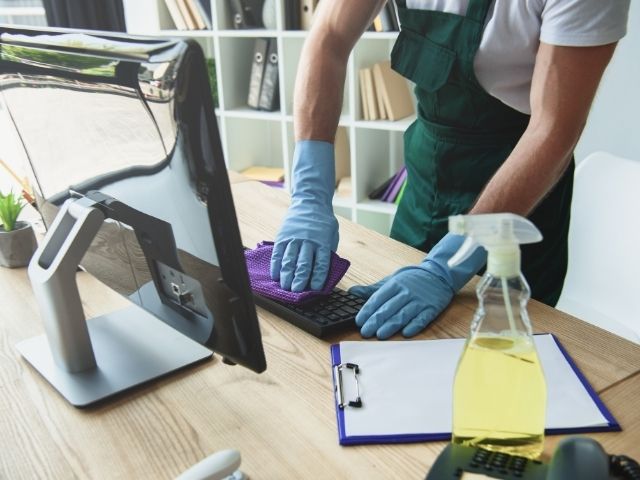Maintaining a spotless work environment is more than a chore—it’s a strategic investment in the success of your business. In today’s fast-paced market, an effective cleaning schedule can transform your space into a productive and inviting haven. Whether you manage an office, restaurant, or retail space, a well-planned cleaning routine is key to ensuring the health and satisfaction of both employees and customers.
Creating a structured cleaning schedule is essential for any business that wants to optimize hygiene and productivity. With strict health standards and a fast-changing environment, companies must adapt their cleaning routines to meet the unique demands of their industry. In the realm of commercial cleaning, regular maintenance isn’t merely about appearances—it’s about fostering a safe and efficient workspace that supports growth and customer confidence.
This blog post will guide you through the best cleaning schedules tailored for offices, restaurants, and retail spaces. We’ll explore how to adapt cleaning routines based on industry needs, share practical tips using bullet points and bold text to highlight key insights, and explain why partnering with experts like Fresh Flare Cleaning Services can make all the difference.
The Importance of a Customized Cleaning Schedule
Every business is unique, and so are its cleaning requirements. A one-size-fits-all approach rarely addresses the nuances of each environment. Instead, a customized cleaning schedule should take into account:
- Business Hours: Cleaning tasks can be scheduled during off-peak hours to minimize disruption.
- High-Touch Areas: Focus on zones that accumulate germs quickly, such as door handles, restrooms, and communal workspaces.
- Industry-Specific Needs: For instance, food service areas require stringent sanitation standards compared to standard office spaces.
- Employee & Customer Traffic: The number of people passing through your space will influence how frequently certain areas need attention.
By assessing these factors, you can create a detailed cleaning plan that maximizes hygiene, safety, and productivity.
Office Cleaning Schedules: Maximizing Productivity
An office is the backbone of your business, and a clean workspace directly impacts employee morale and efficiency. Here’s how to design an office cleaning schedule that works:
Daily Tasks
- Desk and Surface Wipe-Downs: Employees should be encouraged to clear clutter and wipe down their desks at the end of each day.
- Trash Removal: Emptying trash bins daily helps avoid unpleasant odors and potential health hazards.
- Common Areas: Lobbies, break rooms, and meeting rooms require daily attention to maintain a welcoming atmosphere.
Weekly Tasks
- Deep Cleaning of Carpets and Upholstery: Vacuuming and spot cleaning should be scheduled weekly to remove dust and allergens.
- Disinfection of High-Touch Areas: Use hospital-grade disinfectants on door handles, light switches, and shared office equipment.
- Restroom Sanitation: Ensure thorough cleaning and restocking of supplies in restrooms on a weekly basis.
Monthly Tasks
- Window Cleaning and Floor Maintenance: De
- ep clean windows and polish hard floors to keep your office looking pristine.
- HVAC System Check: Regular maintenance of air systems not only improves air quality but also boosts energy efficiency.
By adhering to these schedules, your office remains a productive space where employees can focus without distractions, contributing to overall business success.
Restaurant Cleaning Schedules: Upholding Hygiene Standards
Restaurants are dynamic environments where cleanliness is paramount—not just for customer satisfaction but also for food safety. An effective restaurant cleaning schedule should encompass:
Daily Tasks
- Kitchen and Food Preparation Areas: Clean and sanitize all surfaces after every shift to prevent cross-contamination.
- Dining Areas: Wipe down tables, chairs, and menus between seatings to maintain a fresh dining environment.
- Restrooms: Clean and disinfect frequently throughout the day to ensure a pleasant customer experience.
Weekly Tasks
- Deep Cleaning of Kitchen Equipment: Ovens, grills, and refrigerators require comprehensive cleaning to remove grease and buildup.
- Floor Mopping and Degreasing: Kitchens and dining areas benefit from deep mopping to eliminate spills and stains.
- Ventilation System Checks: Regularly clean and maintain hoods and filters to prevent fire hazards and ensure proper air circulation.
Monthly Tasks
- Pest Control Measures: Schedule professional inspections to avoid infestations that could jeopardize food safety.
- Comprehensive Inspections: Evaluate and repair any worn-out areas or malfunctioning equipment that could disrupt operations.
By implementing a detailed cleaning regimen, restaurants can achieve a level of hygiene that reassures customers and complies with stringent health codes.
Retail Space Cleaning Schedules: Creating Inviting Environments
Retail environments thrive on visual appeal and customer comfort. A meticulously maintained space not only attracts shoppers but also reinforces brand credibility. Consider these cleaning practices for retail spaces:
Daily Tasks
- Floor and Window Cleaning: Dust, sweep, and mop floors to ensure a polished look, while keeping windows spotless for maximum display impact.
- Product Display Areas: Regularly wipe down surfaces where products are showcased to maintain a fresh appearance.
- Checkout Areas: Keep counters and electronic devices sanitized to provide a smooth customer experience.
Weekly Tasks
- Detailed Dusting: Clean shelves, mannequins, and decor to remove accumulated dust.
- Restroom and Fitting Room Maintenance: Focus on cleanliness and replenishment of supplies in all customer-accessible areas.
- Entrance and Exit Zones: Ensure door handles, mats, and display windows are regularly cleaned and inviting.
Monthly Tasks
- Deep-Cleaning of Fixtures and Furniture: Remove all dust and grime from fixtures to maintain a high-end look.
- Storage and Backroom Areas: Organize and clean stock rooms to streamline operations and reduce clutter.
- Exterior Maintenance: Clean building entrances, sidewalks, and parking areas to ensure your store’s first impression is always positive.
A well-structured cleaning schedule in retail spaces not only preserves the visual appeal of your store but also enhances the shopping experience, ultimately driving sales.
Tailoring Your Cleaning Schedule to Industry Needs
No two businesses are identical. A customized cleaning schedule is key to meeting the unique demands of each environment. Here are some best practices for tailoring your cleaning routine:
- Assess Your Space: Begin by identifying high-traffic and high-touch areas specific to your industry.
- Set Realistic Goals: Outline what you want to achieve with your cleaning plan—be it improved air quality, a reduction in allergens, or simply a more inviting atmosphere.
- Choose the Right Tools: Invest in quality cleaning supplies and equipment that meet your industry’s standards.
- Create a Checklist: Develop a daily, weekly, and monthly checklist that details every cleaning task.
- Train Your Team: Ensure that your staff understands the importance of following the schedule and is well-trained in the use of cleaning products and protocols.
- Review and Adjust: Regularly review your cleaning schedule’s effectiveness and make adjustments based on feedback and evolving needs.
This thoughtful approach is the backbone of commercial cleaning strategies that cater to the specific demands of offices, restaurants, and retail spaces alike.
Why Choose Fresh Flare Cleaning Services?
Implementing an effective cleaning schedule can be complex, but you don’t have to do it alone. Fresh Flare Cleaning Services specializes in creating and managing customized cleaning schedules tailored to your business needs. Here’s why partnering with professionals can be a game-changer:
- Expertise: With years of experience, their team understands the intricacies of maintaining a spotless environment across various industries.
- Customized Solutions: They design cleaning schedules that consider your unique business operations, ensuring minimal disruption while maximizing hygiene.
- Quality Assurance: Rigorous quality checks and regular updates ensure that your space is always up to standard.
- Cutting-Edge Techniques: By using the latest cleaning technologies and environmentally friendly products, they guarantee exceptional results.
- Transparent Communication: Stay informed with detailed reports and consistent updates that keep you in the loop about every aspect of your cleaning routine.
Choosing a professional service not only lifts the burden off your shoulders but also ensures that your cleaning regimen is efficient and effective.
Conclusion
A robust cleaning schedule is a cornerstone of a healthy, efficient, and welcoming business environment. Whether you operate an office, restaurant, or retail space, investing time in planning and executing a tailored cleaning routine can lead to significant improvements in hygiene, employee productivity, and customer satisfaction. Remember, the key takeaways are:
- Customized Schedules: Tailor your cleaning routines to meet specific industry demands.
- Regular Maintenance: Implement daily, weekly, and monthly tasks to ensure a consistently clean environment.
- Expert Partnerships: Leverage professional expertise to design and maintain effective cleaning schedules.
Embrace these strategies to elevate your workspace and boost your business’s overall performance. Investing in a robust cleaning schedule is the hallmark of successful commercial cleaning practices that drive long-term growth and customer loyalty.
For further insights and practical tips on maintaining pristine environments, check out our previous blog, High-touch areas requiring frequent cleaning. Explore more content on our website to continue learning how to keep your business spotless and thriving.





